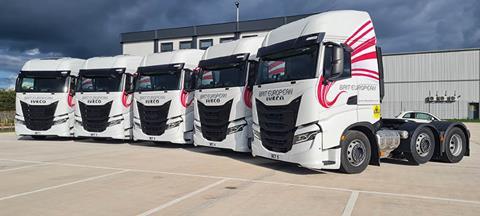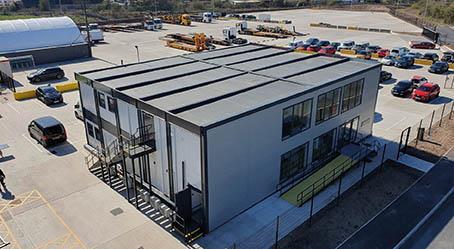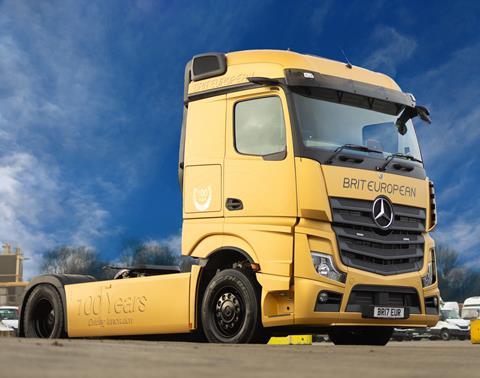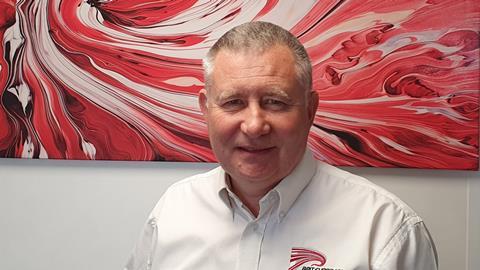Graham Lackey, chief executive of Cheshire-based logistics firm Brit European, reflects on the alarming rise in administrations in the haulage sector, and why he’s still reluctant to switch his fleet to electric, despite recently investing in a carbon neutral site…
Give us some background to Brit European…
We’re a privately-owned business based in Middlewich and we’re celebrating our 100th birthday this year. We provide international specialist logistics across a diverse range of market segments. We also have a recruitment business which was started to provide a resource for our business because transport operators are pretty rubbish at recruiting.
And then the third part is BOS Logistica which focuses on modular movement and the agricultural markets. Last October we bought the assets of Richard Long Transport, based in Norfolk. This was absorbed into the BOS Logistica business.
How’s business?
The general palletised freight side of things is tough, but automotive, which is a large part of our business, had a bumper 2023 because everybody was catching up on back orders. Then you saw business turn in about October time. In the last two years, we’ve had 20% growth but I’m not sure what this year will bring. Probably the acquisition will offset the general market trends here.
What do you make of the big recent increase in administrations in the haulage sector?
Covid allowed a lot of zombie businesses to limp on. And the government funded them to limp on. At some point we had to have a sort-out. That should have happened in 2020. It should have been natural and all we’ve done is delayed it with all the bounce-back loans and all the furlough money. The government kept it all going, they stuck a big sticking plaster on and now it’s come off.
But aren’t you surprised that some fairly big players have collapsed?
Look at what they really leverage. Eventually you can’t keep leveraging a business. People would argue we’ve probably been conservative in that respect. But that’s how the business has always been run.

Has your focus on automotive meant you’re bucking the trend?
I think we’re solid, we didn’t get carried away last year putting a load more trucks and trailers in for all this new work. We knew it wasn’t going to stay there very long. There was a lot of encouragement to obviously invest in that peak, but it was always going to be a false peak.
What are the biggest challenges?
The economy and interest rates, whether that’s somebody who’s putting construction equipment onto a rental fleet or punters buying cars etc.
Between now and August, we’re going to start to see it ease but one interest rate move isn’t going to suddenly trigger a tsunami of activity. It’s not going to suddenly stimulate the housing sector, it’s not going to make you rush out and buy a new car.
We also obviously have to keep an eye on what the Euro is doing because of the cross-border trade that we have.
Quality of drivers is also a challenge, hence why we put in our own academy. So we take drivers quite often without HGV licences or with a Class 2 and we bring them all the way through.
Then you have the perennial problem where manufacturers oversell against their dealer networks and put pressure on. There’s a massive shortage of good truck technicians so we’re constantly recruiting them.
Do young people want that kind of job anymore?
When you’re paid £45,000 upwards to be a mechanic there’s a lot of incentive. But at some point in the not too distant future the truck technologies are all going to change - electric motors, hydrogen. That’s going to change it all again in the next 10 to 20 years.
What would be your advice to struggling SMEs with costs rising and volumes reducing?
You need to be a bloody grizzly bear, which means you need to really nail down on everything. You’re going to have to invest in systems and processes. Build critical mass as a point of difference.
How far has the sector come in recovering from Brexit?
After six months we saw it settle, certainly in terms of cross-border paperwork. So business generally is pretty good. The automotive industry had terrible supply chain issues but last year they got things sorted and caught up.
Have you begun decarbonising your fleet?
Electric doesn’t make commercial make sense. You’ve got nowhere to charge. When we’ve done the theoretical exercise the clients just look at us and say, ‘why am I going to pay a 40% premium to move something on an electric vehicle?’
But we were pretty much the first with the dual fuel journey. That was 10 years ago, using LNG and CNG. And we’ve done everything we can in terms of the equipment, we’ve stopped throwing trailers away so quickly…. But commercially, clients won’t pay and operationally you can’t make it work for electric, or for hydrogen. So we’re fairly neutral at the minute and we’ll go whichever way is available and suits the customers’ pocket and operational need.
We’re doing what we can; we built this site as a carbon neutral off-grid site. It was probably a 5% premium on a conventional build. But I think over a five-year period, we will get that back because of the energy efficiency that we’ve put in.
What was the cost of project?
In excess of a million pounds an acre, and we have five-and-a-half acres.

What direction will you eventually go to decarbonise your fleet?
We know we’ve got some customers that want us to go down the HVO route and are willing to pay the premium so we’re doing some of that. But obviously, there’s not endless supplies, and there’s a cost so it’s predominantly diesel.
Will many hauliers continue running fleets on diesel for as long as they can?
I think that’s going to be true for a lot of industry. We have exactly that debate as a board. Is it the right time? By the time this vehicle gets to the end of its life is it going to be old hat? Is it going to be out of sync with the market? We haven’t answered yes to that yet.
So the next buying round is going to be critical?
Yes, this next five years is critical for everybody. I don’t know where I see it in terms of direct burn hydrogen, I think that’s unlikely. But whether it’s a fuel cell or whether it’s a battery depends where that all goes, because they’ve got to get lighter. They’ve got to get cheaper and smaller, and the range has got to get more effective. If you can get to the point where you can get to a fueling station easily, similar to what we do today, then why not? But I don’t know whether the chemistry and the science behind the battery allows you to get to that point.
Are you optimistic that the government’s net zero targets for HGVs can be met?
Yes, I believe the grid is developing. But I think it’ll be a long time before even the local power providers can link up the people that need it. I’m pretty sure the government know that these issues exist, but they’re hoping that private industry and everything is going to step in and solve them.
What should the starting point be in solving these issues?
The National Grid, but it’s not. I hear conflicting stories. People say to me, ‘well, we don’t have enough power so how can we electrify everything?’ And then I hear people say, ‘we’ve got enough power, we just can’t get it to the right place.’ So everything starts with the Grid being good enough to then connect everybody. And I don’t think we’re there.
Do you expect an influx of electric trucks from Chinese manufacturers like BYD?
There’s lots of noise in the automotive industry about the markets being flooded with Chinese vehicles, mainly cars. But again, why flood the market with a product that people can’t use?
How much will AI influence the future of haulage?
It will help us because we have a huge amount of data coming at us - traffic conditions, route planning, low buildings, weather conditions… I think it will help us process all of that data very, very quickly and effectively.
What’s the best thing about your job?
We do all sorts of unusual stuff and have always been very innovative in terms of seeing specialist niches. And as soon as they become a commodity we’ve reinvented ourselves and moved on again. But it was all a little bit haphazard, so I brought in a bit more discipline, structure and attention to detail.
What are your biggest frustrations about the transport sector?
People using many umbrella set-ups to avoid tax, which is a bone of contention we make because we do it right. There are a lot of people out there cheating the taxman and getting an unfair advantage.Then any bona fide agency can’t compete.
HMRC issued a public consultation last August and we’ve heard nothing since despite talking with our MP. HMRC change the rules, then somebody finds another loophole.














